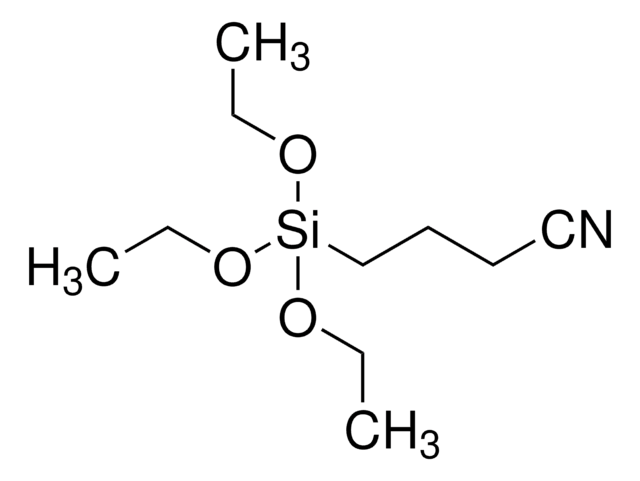569615
(3-Chloropropyl)triethoxysilane
95%
Synonym(s):
(gamma-Chloropropyl)triethoxysilane, 3-(Triethoxysilyl)-1-chloropropane, 3-(Triethoxysilyl)propyl chloride, 3-Chloropropropyltriethoxysilane
Sign Into View Organizational & Contract Pricing
All Photos(1)
About This Item
Linear Formula:
ClCH2CH2CH2Si(OCH2CH3)3
CAS Number:
Molecular Weight:
240.80
Beilstein:
1754992
EC Number:
MDL number:
UNSPSC Code:
12352103
PubChem Substance ID:
NACRES:
NA.22
Recommended Products
Quality Level
Assay
95%
refractive index
n20/D 1.418 (lit.)
density
1.000 g/mL at 25 °C (lit.)
functional group
chloro
SMILES string
CCO[Si](CCCCl)(OCC)OCC
InChI
1S/C9H21ClO3Si/c1-4-11-14(12-5-2,13-6-3)9-7-8-10/h4-9H2,1-3H3
InChI key
KSCAZPYHLGGNPZ-UHFFFAOYSA-N
Looking for similar products? Visit Product Comparison Guide
Signal Word
Warning
Hazard Statements
Precautionary Statements
Hazard Classifications
Flam. Liq. 3
Storage Class Code
3 - Flammable liquids
WGK
WGK 1
Flash Point(F)
98.6 °F
Flash Point(C)
37 °C
Choose from one of the most recent versions:
Already Own This Product?
Find documentation for the products that you have recently purchased in the Document Library.
Customers Also Viewed
Kheibar Dashtian et al.
Journal of colloid and interface science, 494, 114-123 (2017-02-06)
A selective adsorbent based on the modification of mesoprous SBA-15 with N,N'-bis(salicylidene)-1,3-ethylenediamine Schiff base and decorated with Fe
Younes Ellahioui et al.
Dalton transactions (Cambridge, England : 2003), 48(18), 5940-5951 (2018-09-14)
A series of nanomaterials based on mesoporous silica have been synthesised and functionalised with a photoactive polypyridyl ruthenium(ii) complex, namely [Ru(bipy)2-dppz-7-hydroxymethyl][PF6]2 (bipy = 2,2'-bipyridine, dppz = dipyrido[3,2-a:2',3'-c]phenazine), by various methods. The functionalisation reactions were based on the covalent binding to
Nicholas G Fischer et al.
Coatings (Basel, Switzerland), 10(6) (2020-08-29)
Many chemical routes have been proposed to immobilize peptides on biomedical device surfaces, and in particular, on dental implants to prevent peri-implantitis. While a number of factors affect peptide immobilization quality, an easily controllable factor is the chemistry used to
Minghua Lu
The Analyst, 142(18), 3477-3483 (2017-08-23)
An electrochemical sensing platform was designed to monitor telomerase activity in HeLa cells, using bioresponsively controlled cargo release from magnetic mesoporous silica nanocontainers (MMSNs). The aminated MMSNs were first synthesized by a wet-chemistry method, then methylene blue (indicator) molecules were
Lin Zhou et al.
Colloids and surfaces. B, Biointerfaces, 160, 581-588 (2017-10-14)
The inflammatory reaction around the implant after implant placement is important not only for osseointegration but also for long-term implant survivals. In our study, GL13K, an antimicrobial peptide, was immobilized onto titanium surfaces to improve its anti-inflammatory properties. The method
Our team of scientists has experience in all areas of research including Life Science, Material Science, Chemical Synthesis, Chromatography, Analytical and many others.
Contact Technical Service











